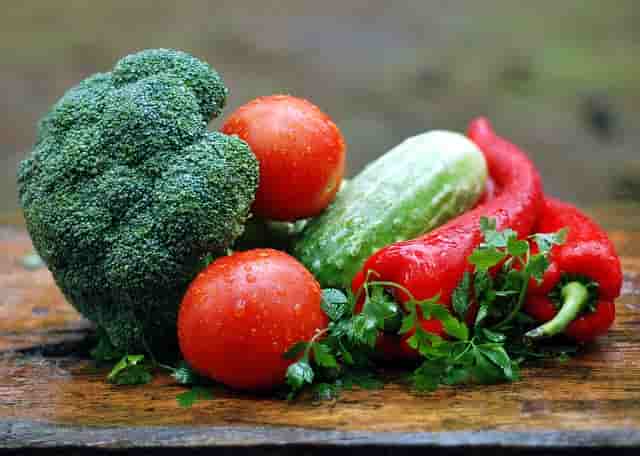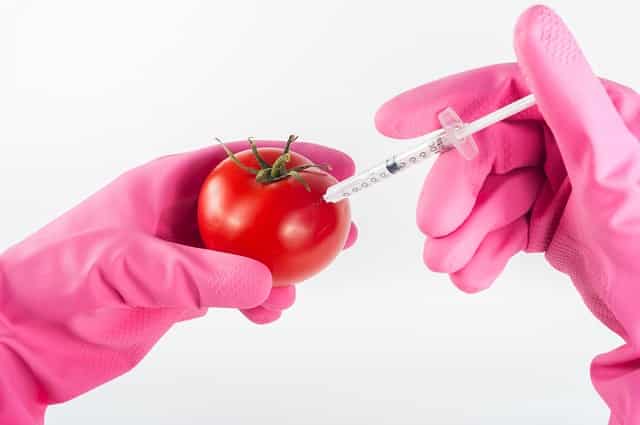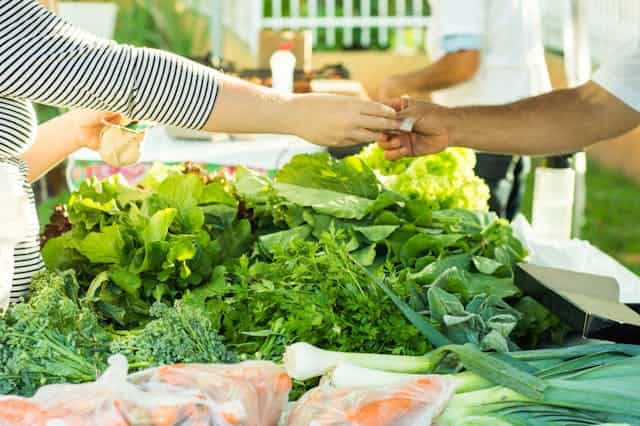Featured image: organic vegetables.
In this modern age, where convenience is of great essence, the trend of buying organic food online is on the rise. The digital era brings the convenience of accessing a wide range of organic food options online, encompassing everything from organic fruits and vegetables to meats, pantry staples, and even meal kits.
Advocacy from healthcare providers underscores the significance of the best place to buy organic food online, highlighting not only the convenience but also the health benefits tied to consuming nutrient-rich organic foods.
This move to online platforms, such as organic food delivery services and nearby organic stores, highlights the growing trend of mindful eating as a means of maintaining a balanced lifestyle.
Customers searching for organic products online encounter a wide range of options from reputable brands such as Whole Foods, Monterey Market, Berkeley Bowl, and Trader Joe’s, all of which have established themselves as leaders in the organic product space.
This demonstrates how quickly and easily customers can now reach natural grocery stores, organic food markets, and high-quality organic products with just a few clicks.
The following sections of this post will discuss the best online retailers for organic food, how to choose high-quality organic products while buying online, and how to save money on organic groceries – all with the goal of helping us make healthier choices seamlessly.
What is the meaning of buying organic food online?
Buying organic food online is a modern means of purchasing fresh, high-quality organic food through digital platforms. It’s a process that bridges the gap between consumers and their quest for healthier food options.
The online networks that make this service possible are made to put you in contact with growers of organic food, guaranteeing that the food you eat is free of synthetic additives, genetically modified ingredients, and harmful substances to the environment.
Understanding Organic Foods
Organic farming emphasizes sustainability and environmental stewardship, which are crucial for promoting a healthier planet. By adhering to practices that avoid the use of synthetic pesticides and fertilizers, organic farming helps reduce pollution, conserve water, and enhance soil fertility.
Specifically, these methods include managing soil fertility through natural means such as crop rotations and using only approved substances for pest and disease control.
The term “organic” denotes that the food or agricultural product has been produced through methods that integrate cultural, biological, and mechanical practices that foster the cycling of resources, promote ecological balance, and conserve biodiversity.

Figure 1: Organic pomegranates
This includes strict guidelines such as the prohibition of genetic engineering, ionizing radiation, and the use of sewage sludge in crop production.
Livestock must be raised in conditions that accommodate their natural behaviors with a diet consisting of 100% organic feed, and they must not be administered antibiotics or growth hormones.
Product quality is ensured by the rigorous process of organic certification, which involves yearly on-site inspections and thorough documentation.
This accreditation addresses every facet of organic farming, including crop health, pest management, soil conditions, and seed sources.
In addition to providing customers with a guarantee of product quality, it also promotes ethical farming methods, increasing transparency and trust in organic product labeling.
Understanding the Organic Food Market
The market for organic food has expanded significantly over time.
According to the Organic Trade Association, U.S. organic food sales hit $56.4 billion in 2020, up 12.8% from the previous year, marking the first time that total sales of organic food in the U.S. have surpassed $50 billion.
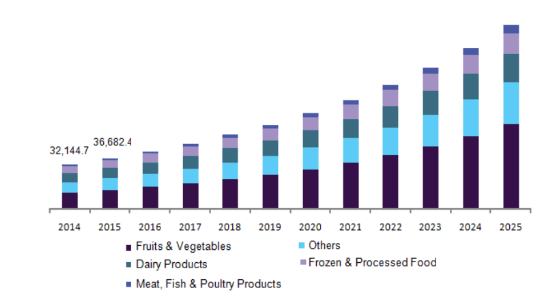
Figure 2: U.S. organic food market revenue by product, 2014–2025 (USD Million)
Source: (Golijan & Dimitrijević, 2018).
Notwithstanding their relatively high cost, several consumers are willing to pay a premium for organic products because of their perceived health and environmental benefits.
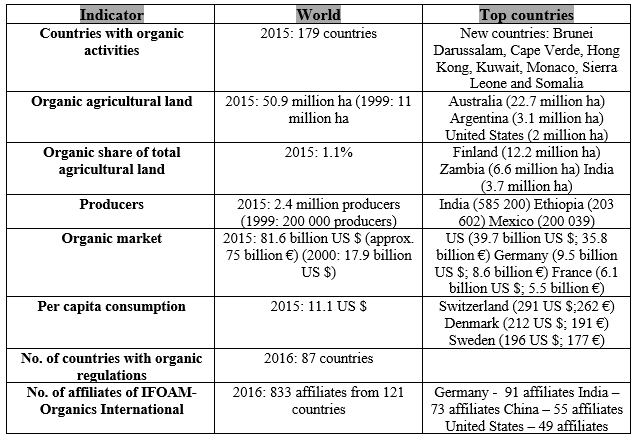
Table 1: Organic Agriculture: Key Indicators and Top Countries
Source: (Golijan & Dimitrijević, 2018).
Why choose to buy organic food online?
Online platforms for organic food not only provide unmatched convenience but also offer a wider spectrum of benefits that cater to the modern consumer’s needs. There are various reasons for opting to buy organic food online. The main reasons include:
- Convenience: One of the primary benefits of purchasing organic food online is the significant savings in time and energy. Online platforms allow you to buy organic food whenever and wherever you want. It saves you the hassle of traveling to physical stores and standing in long queues. This convenience is especially beneficial for busy individuals or those with mobility issues.
- Affordability: Shopping online can be more cost-effective compared to visiting physical stores. Consumers can easily compare prices across various websites, take advantage of online-only discounts, and benefit from promotions such as reduced prices on bulk purchases. For instance, platforms like Thrive Market offer significant discounts on initial orders, further adding to the savings.
- Availability: Online buying can be quite helpful if you live in a place where organic food is hard to come by. Numerous organic products are available on these platforms and can be delivered right to your doorstep.
- Wide Range of Products: Online platforms often boast a larger selection of organic products than local grocery stores, which is particularly advantageous for those living in areas with limited options. This includes a diverse range of organic meats, fruits, vegetables, and pantry staples that may not be available locally. Additionally, detailed product information and reviews help consumers make informed choices, enhancing their shopping experience.
- Easy Comparison: When purchasing organic food online, you can quickly evaluate costs, read customer feedback, and examine the components and dietary data of various items, all of which can assist you in making a sound decision.
These benefits of online shopping make it a great option for today’s organic food customers because they not only expedite the purchasing process but also encourage a lifestyle that prioritizes convenience and health.
Top Online Stores for Organic Food
1. Thrive Market
Thrive Market stands out by offering a membership-based model that provides access to organic and natural products at wholesale prices, making it an affordable option for regular shoppers.

Figure 3: Thrive Market customers (Source: Thrive Market, 2020).
They specialize in organic snacks and pantry items, offering these at prices generally lower than what you’d find in supermarkets, with a yearly membership available at $60 or a monthly option for $5.
Pros:
- Thrive Market offers low prices on popular natural & organic brands.
- Free shipping on your first order over $25 and all orders over $49.
- For every membership purchased, they donate one to a family in need.
Cons:
- Membership fee of $59.95 per year.
2. Misfits Market
Misfits Market addresses the issue of food waste while providing organic produce. They offer flexible purchasing options, including weekly boxes or a la carte choices, which cater to different consumer needs.
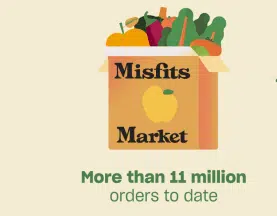
Figure 4: Misfits Market (Source: Misfits Market 2021 Annual Report).
Pros:
- Prices are up to 30% less than grocery store prices.
- There is no membership fee.
Cons:
- Produce is sometimes irregularly sized.
3. ButcherBox
For meat lovers, ButcherBox delivers organic, grass-fed, and humanely raised meats through a subscription service. They are particularly noted for their grass-fed beef, ensuring that high standards of quality and ethics are met. Crowd Cow also focuses on providing organic chicken with options for one-time or recurring deliveries, catering to different consumer preferences.
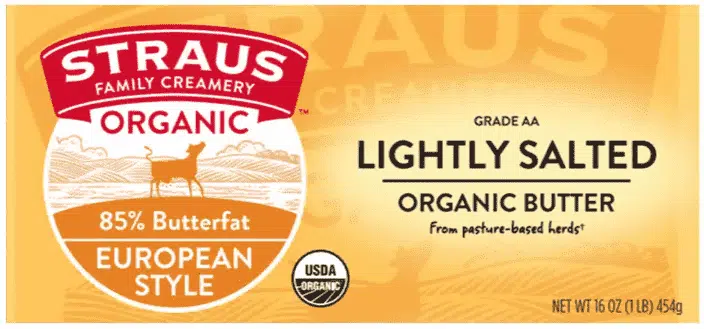
Figure 5: Lightly Salted European Style Butter (Source: ButcherBox)
Pros:
- High-quality, ethically raised meats at a reasonable price.
- Boxes can be customized each month.
Cons:
- Meat is frozen.
4. Amazon Grocery
Amazon, the global online marketplace, also offers a wide variety of organic food items.
Similarly, Amazon Fresh enhances the consumer experience by providing a broad selection of organic produce and staples, integrating convenience with variety.

Figure 6: Amazon products
Pros:
- Many organic brands are available.
- Free shipping for Prime members on shelf-stable Amazon groceries.
Cons:
- Brands aren’t carefully vetted for quality so you can find a lot of greenwashing and health washing.
- It can be confusing to navigate the different ways of ordering.
5. Public Goods
Public Goods focuses on essentials for daily life, including organic food, non-toxic cleaning supplies, personal care, and sustainable household goods.
Pros:
- Most food products are USDA-certified organic and non-GMO.
- Packaging is simple, minimalist, and eco-friendly.
Cons:
- Yearly membership fee of $79.
Every one of these online retailers not only supports ethical and sustainable farming techniques but also better eating habits, which is in line with the growing consumer desire for food production that is transparent and environmentally responsible.
How to Choose Quality Organic Products Online
Research and Choose Reputable Sellers
It’s important to do your homework and pick reliable vendors when buying organic products online. Look for certifications such as USDA Organic or the relevant Organic Certification from your country’s regulatory body.
In addition, perusing customer reviews and testimonials can offer valuable perspectives about the caliber and dependability of the vendor’s offerings.
Verify Product Descriptions and Labels
It’s crucial to thoroughly check the labels and product descriptions. Ensure that the product is certified organic and free from synthetic pesticides, herbicides, and genetically modified organisms (GMOs).
Watch out for deceptive claims or ambiguous wording that could make it difficult to determine whether a product is organic.
Understand Organic Labeling
It’s important to comprehend organic labels when purchasing fruits and vegetables. Look for produce stickers that start with a “9,” indicating that the items are organic. This simple check can help you ensure that you are truly purchasing organic produce.
Check for Freshness and Quality
It is vital to choose vendors who place a high priority on quality assurance and freshness in their packing and delivery procedures.
Look for assurances such as refrigerated shipping for perishable items like fruits and vegetables. By doing this, you can be certain that the organic items you receive are as fresh as possible, retaining their flavor and nutritional content.
Saving Money on Organic Groceries
Utilize Discounts and Plan Purchases
One effective strategy for saving on organic groceries involves waiting for sales and using coupons. Many online stores offer periodic sales on organic products, which can significantly reduce costs when timed right.
Additionally, leveraging coupons from sources like Coupons.com and SmartSource can provide direct savings on organic purchases. Planning meals around these discounts and purchasing in bulk during sales are practical ways to stretch your grocery budget further.
Maximize Savings Through Technology and Lifestyle Choices
Utilizing money-saving apps like Ibotta and Fetch Rewards can lead to additional rebates and rewards on organic grocery purchases.
Additionally, incorporating at least one meatless meal per week and extending meat dishes with beans or rice can help reduce total food expenses without sacrificing nutritional content.
Embrace Alternative Shopping Venues and Techniques
Shopping at budget-friendly stores such as Aldi, Trader Joe’s, and Costco can yield considerable savings, especially when buying organic products. These stores often feature competitive prices on organic items, making them ideal for budget-conscious shoppers.
Furthermore, joining a Community Supported Agriculture (CSA) program can offer fresh organic produce at reduced prices, supporting local farmers while ensuring a steady supply of seasonal items.
Navigating Shipping and Delivery Options
When thinking about organic food shipping, it’s important to compare the terms that different online retailers offer.
For example, Misfits Market prioritizes sustainability by using recyclable or reusable packaging and offers free shipping on orders over $60.
Likewise, Public Goods offers complimentary shipping for purchases over $45 and includes a free 2-week trial membership, allowing new customers to experience their service without immediate commitment.
For individuals seeking a broader range of organic products without a membership fee, Vitacost provides free shipping on purchases over $49, making it an affordable option for regular consumers.
Amazon Grocery steps up by providing free shipping for Prime members on shelf-stable products and complimentary delivery for Amazon Fresh on orders above $50, which integrates well with their vast array of organic and natural products.
However, when shipping perishable items, the logistics become more complex. It is crucial to use appropriate packaging and insulation to ensure that food remains fresh and safe during transit.
This might include insulated boxes and ice packs, among other cooling materials. Additionally, choosing the right shipping carrier and method is vital, especially for perishable food, where delivery time and the food’s shelf life upon arrival are critical considerations.
The Importance of Local and Seasonal Organic Products
Purchasing local and seasonal organic products provides a number of benefits that go beyond just personal health to encompass community welfare and environmental sustainability.
When you purchase directly from farmers at markets or through Community Supported Agriculture (CSA) programs, not only are you getting fresher produce, but you’re also supporting the local economy and reducing environmental impact.
Economic and Environmental Advantages
- Support Local Farmers: Engaging with local farmers allows money to stay within the community, bolstering the local economy and directly supporting agricultural jobs.
- Enhance Biodiversity: Seasonal eating encourages the growth and consumption of a wider variety of plants, which supports local wildlife and biodiversity.
- Reduce Carbon Footprint: Local produce doesn’t travel long distances, significantly cutting down on carbon emissions associated with transportation.
Health and Community Benefits
- Community Engagement: Shopping locally enhances community ties by connecting consumers with farmers, fostering a greater understanding of where and how food is produced.
- Fresher and More Nutritious: Local foods are often harvested at their peak and sold shortly thereafter, which helps retain higher nutrient levels and superior flavor.
- Promotes Food Safety: Shorter supply chains associated with local food systems reduce the risk of contamination and improve overall food safety.
Embracing local and seasonal foods not only helps maintain a healthier lifestyle but also plays a crucial role in building resilient local economies and sustainable food systems.
By opting to buy locally, you can enjoy fresher, tastier, and more nutritious foods while also contributing to the environmental and economic health of your community.
Organic Food Subscription Services
Thrive Market: Supporting Communities
Thrive Market is unique not only for its extensive selection of organic products but also for its dedication to social impact, providing low-income American families with free memberships.
This program reflects the company’s commitment to ensuring that everyone has access to healthy, organic food by filling the gap in access for different populations.
ButcherBox: Customizable Quality Meats
ButcherBox is renowned for delivering high-quality meats at reasonable prices.
Customers appreciate the flexibility to customize their boxes and delivery schedules according to their dietary preferences, making it a popular choice for those committed to consuming ethically sourced organic meats.
Comprehensive Meal Solutions
Several services cater to specific dietary needs and preferences. For instance, Green Chef offers USDA-certified organic ingredients and a variety of meal plans that cater to gourmet tastes, with a maximum of four meals per week.
On the other hand, Fresh n’ Lean provides 100% gluten-free, fully prepared meals, although customers do not have the option to choose specific meals, which might be a limitation for some.
Sakara Life offers a premium, plant-based meal service with high-quality ingredients but does not provide nutritional information, which could be a drawback for those tracking their dietary intake.
These services make it easier for individuals to maintain a healthy lifestyle by delivering organic foodstuffs on a regular and dependable basis, in addition to catering to a wide range of dietary requirements.
Tips for Saving Money on Organic Food Online
Although organic food is typically costlier than its non-organic cousin, there are ways to cut costs:
Buy in bulk
Purchasing in bulk frequently results in lower costs than purchasing in smaller amounts. Several online stores provide discounts for bulk purchases.
Use coupons and discounts
Several online stores offer coupons and discounts. Be sure to check for these before making a purchase.
Shop seasonally
Buying vegetables and fruits that are in season can also help you save money. These products are often fresher and cheaper compared to out-of-season produce.
Compare prices
Before buying, compare prices from different online stores to ensure you’re getting the best deal.
Conclusion
Throughout this post, we’ve delved into the many benefits and avenues for purchasing organic food online, from enhancing personal health to supporting environmental sustainability and ethical farming practices.
Our goal is to enable you to make well-informed decisions that are consistent with your ethical principles and health objectives by showcasing trustworthy online retailers, providing advice on how to choose high-quality products, and emphasizing the value of local and seasonal options.
The post reiterates the idea that online platforms have made it much easier to obtain a variety of organic foods, which has led to the promotion of more conscientious and health-conscious eating habits.
Further, we’ve covered useful money saving strategies for organic food, which not only increase accessibility to organic eating but also encourage a sustainable way of life that is good for the planet and its inhabitants.
The implications of these discussions are far-reaching, suggesting that as more people turn to organic foods, we may see broader societal shifts toward environmental stewardship and healthier living.
To sum up, I hope this post will help you embrace organic food while still enjoying the ease of online purchasing and encourage you to learn more about the advantages of going organic for both our own well-being and the environment.
FAQs
Q: Which three types of produce should always be purchased organically?
A: Strawberries, spinach, kale, mustard greens, collard greens, pears, nectarines, apples, and grapes are among the foods that are strongly suggested to be purchased organic because of their high exposure to pesticides when cultivated conventionally. These items frequently make the Environmental Working Group’s (EWG) Dirty Dozen list for 2024.
Q: How can I reduce my expenses on organic groceries?
A: Shop at farmer’s markets or take part in a Community Supported Agriculture (CSA) program to save money on organic groceries. Focus on buying the most essential organic items, prioritize fresh and seasonal produce, buy in bulk and prepare large meals for freezing, make homemade condiments, sauces, and dressings, grow your own produce, and preserve foods by canning or drying.
Q: What are the disadvantages of purchasing organic foods?
A: The main disadvantage of purchasing organic food is its increased price in comparison to conventionally cultivated food. The increased prices are often a result of more expensive farming methods that are used to maintain organic standards.
Q: What organic food product had the highest sales in recent years?
A: In 2023, organic berries topped the sales charts for organic products, generating approximately 1.6 billion U.S. dollars. Other popular organic items included packaged salads and apples.
References
Golijan, J., & Dimitrijević, B. (2018). Global organic food market. Acta Agriculturae Serbica, 23(46), 125–140.
Misfits Market. Misfits Market 2021 Annual Report.
Thrive Market (2020). Facing the Year, Together. 2020 Impact Report.
